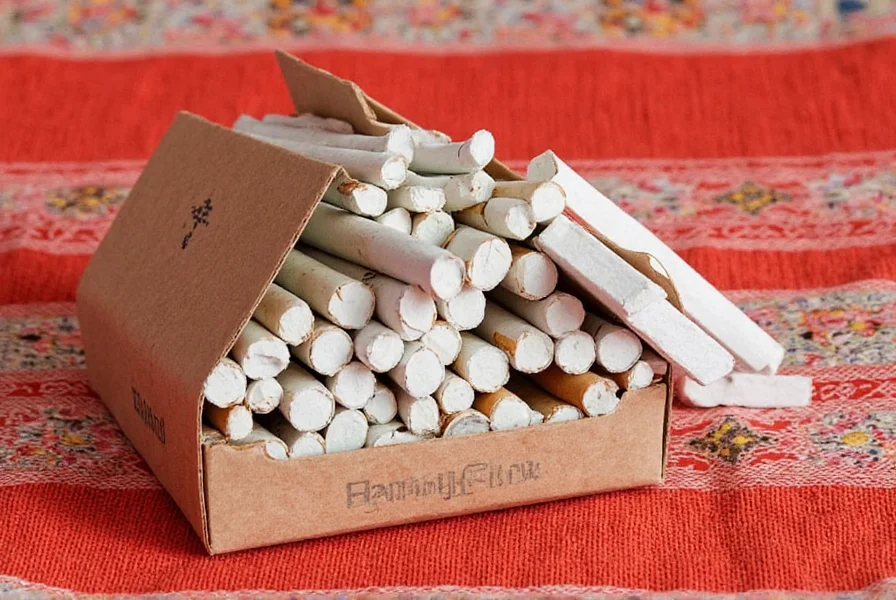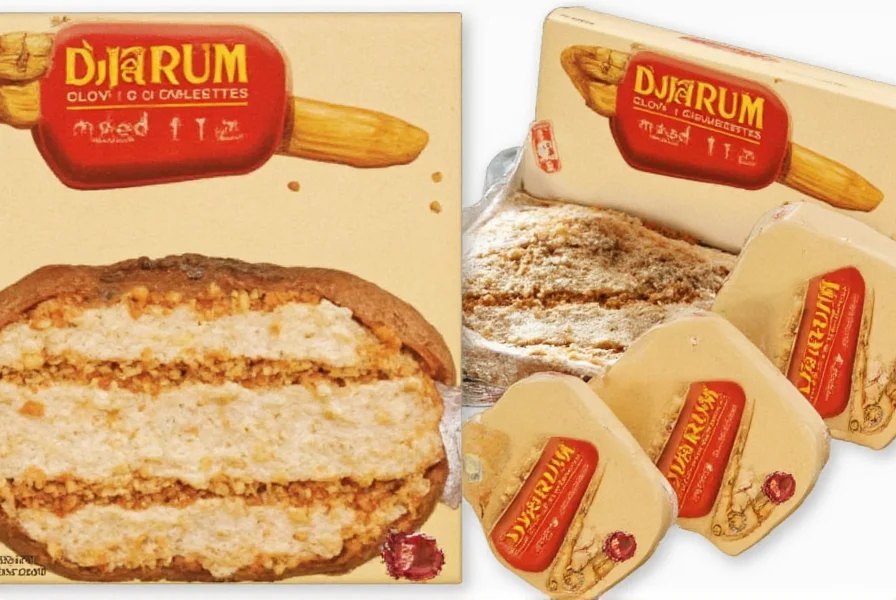Djarum clove cigarettes represent a distinctive category within the global tobacco market, characterized by their unique blend of tobacco and aromatic clove buds. These products, manufactured by the Indonesian company Djarum, have gained international recognition since their introduction in the 1960s. Understanding their composition, regulatory status, and health implications requires examining both historical context and current scientific consensus.
Composition and Manufacturing Process
Djarum clove cigarettes typically contain approximately 60-80% tobacco and 20-40% ground clove buds, creating their signature sweet-spicy aroma. The manufacturing process involves:
- Selection of high-quality tobacco leaves from Indonesian plantations
- Processing of locally sourced clove buds (Syzygium aromaticum)
- Specialized blending to achieve consistent flavor profiles
- Rolling in traditional cigarette paper with distinctive dark brown wrappers
The clove content produces a numbing effect that can make the smoke feel less harsh, potentially leading users to inhale more deeply. This characteristic has raised particular health concerns among medical professionals studying djarum clove cigarettes health effects.

Historical Development and Global Expansion
The Djarum brand originated in Kudus, Central Java, in 1951 when Oei Wie Gwan purchased a small kretek (clove cigarette) operation. The company transformed kreteks from a regional Indonesian product into a globally recognized brand through:
- Introduction of filtered kreteks in the 1980s
- Strategic international distribution partnerships
- Targeted marketing in Western markets during the 1990s-2000s
- Development of various strength options (mild, regular, strong)
Before the U.S. ban, Djarum became particularly popular among young adult smokers who were drawn to the distinctive flavor profile of djarum clove cigarettes ingredients. The brand's international success story represents one of the most significant cross-cultural tobacco product adoptions of the late 20th century.
Regulatory Status Worldwide
The legal status of Djarum clove cigarettes varies significantly across different jurisdictions:
| Country/Region | Legal Status | Key Regulations |
|---|---|---|
| United States | Banned since 2009 | Family Smoking Prevention and Tobacco Control Act prohibits flavored cigarettes (except menthol) |
| Indonesia | Legal | Major domestic product; subject to standard tobacco regulations |
| European Union | Varies by country | Some countries allow sale; others restrict based on flavor regulations |
| Canada | Legal with restrictions | Sold in specialty tobacco shops with age verification |
The U.S. Food and Drug Administration determined that flavored cigarettes like Djarum kreteks appeal disproportionately to youth smokers, contributing to the djarum clove cigarettes ban in us. Despite the ban, enforcement challenges persist with illegal imports and black market sales continuing to some extent.
Health Considerations and Research Findings
Contrary to popular belief, clove cigarettes are not a safer alternative to regular tobacco products. Research published in journals like Tobacco Control has demonstrated that:
- Djarum kreteks deliver similar or higher levels of nicotine, tar, and carbon monoxide
- The numbing effect of clove may encourage deeper inhalation
- Eugenol (the main compound in cloves) doesn't reduce harm but may mask irritation
- They carry identical risks for cancer, heart disease, and respiratory conditions
The Centers for Disease Control and Prevention explicitly states that are djarum cigarettes still sold legally in the U.S. is irrelevant to their health risks, as all cigarette smoking carries significant health consequences regardless of flavoring. The American Lung Association emphasizes that no cigarette is safe, including those with clove flavoring.
Cultural Significance and Market Evolution
In Indonesia, kreteks hold deep cultural significance beyond mere tobacco products. Traditional kreteks were developed in the 19th century as medicinal products before evolving into recreational smoking items. The history of djarum clove cigarettes reflects Indonesia's complex relationship with this indigenous product:
- Originally created by Javanese herbalists for respiratory relief
- Became national symbol and major export product
- Supported millions of jobs in agriculture and manufacturing
- Faced increasing regulation as health concerns grew globally
While the U.S. market is closed to new sales, collectors and former users often search for information about where to buy djarum clove cigarettes legally in permitted jurisdictions. The brand continues to maintain a dedicated following worldwide, though the market has contracted significantly following regulatory changes in major Western markets.
Current Market Status and Alternatives
Following the U.S. ban and similar restrictions elsewhere, Djarum has adapted by:
- Expanding in permitted international markets
- Developing non-cigarette tobacco products
- Introducing new flavor variations within regulatory constraints
- Shifting marketing focus to traditional markets
For those seeking similar flavor experiences within legal boundaries, some consumers have turned to:
- Roll-your-own tobacco with clove flavoring (where legal)
- Specialty pipe tobacco blends
- Non-tobacco herbal smoking alternatives
- Vapor products with clove flavoring (subject to local regulations)
However, health authorities caution that any inhalation of combusted plant material carries risks, and no smoking product should be considered safe.
Why are Djarum clove cigarettes banned in the United States?
Djarum clove cigarettes were banned in the United States in 2009 under the Family Smoking Prevention and Tobacco Control Act. The FDA determined that flavored cigarettes like kreteks appeal disproportionately to youth smokers, contributing to increased smoking initiation among minors. The ban specifically prohibits cigarettes with characterizing flavors (other than menthol), which includes clove-flavored products.
Are clove cigarettes safer than regular cigarettes?
No, clove cigarettes are not safer than regular cigarettes. Research shows they deliver similar or higher levels of nicotine, tar, and carbon monoxide. The eugenol in cloves may numb the throat, potentially leading to deeper inhalation and increased exposure to harmful chemicals. Major health organizations including the CDC and American Lung Association state that all cigarette smoking carries significant health risks regardless of flavoring.
Where can I legally purchase Djarum clove cigarettes?
Djarum clove cigarettes remain legally available in Indonesia, their country of origin, and in some other countries including parts of Europe, Canada, and certain Asian and Latin American nations. Availability varies by local regulations, and they are prohibited in the United States, Australia, and several other countries with strict flavored tobacco bans. Always verify current local laws before attempting purchase.
What are the main ingredients in Djarum clove cigarettes?
Djarum clove cigarettes typically contain 60-80% tobacco and 20-40% ground clove buds (Syzygium aromaticum), along with other flavorings and additives. The distinctive blend creates their characteristic sweet-spicy aroma. The cigarettes also contain standard cigarette paper and may include filters in certain product variations. Like all cigarettes, they produce harmful chemicals when burned, including nicotine, tar, and carbon monoxide.
Do Djarum clove cigarettes contain more nicotine than regular cigarettes?
Djarum clove cigarettes generally contain similar nicotine levels to regular cigarettes, though specific amounts vary by product. Some studies have found slightly higher nicotine delivery in certain kretek varieties due to deeper inhalation encouraged by the numbing effect of eugenol in cloves. The CDC notes that kreteks may deliver comparable or higher levels of nicotine, tar, and carbon monoxide than regular cigarettes, depending on smoking behavior.











 浙公网安备
33010002000092号
浙公网安备
33010002000092号 浙B2-20120091-4
浙B2-20120091-4